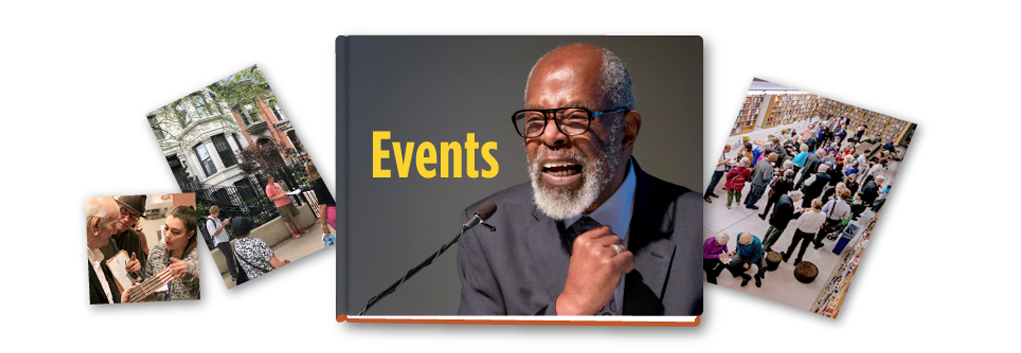Mike Burke and Robert Charles: Our Great Gimlet Impressarios
Tuesday, February 13, 2024
Michael Burke and Robert Charles are quintessential community builders. If you don’t know them, you know people who do. You see them at a wide variety of Chicago cultural events – theater, music, dance, art, sports, and other fun happenings. They’re staples at nonprofit fundraisers. You might run
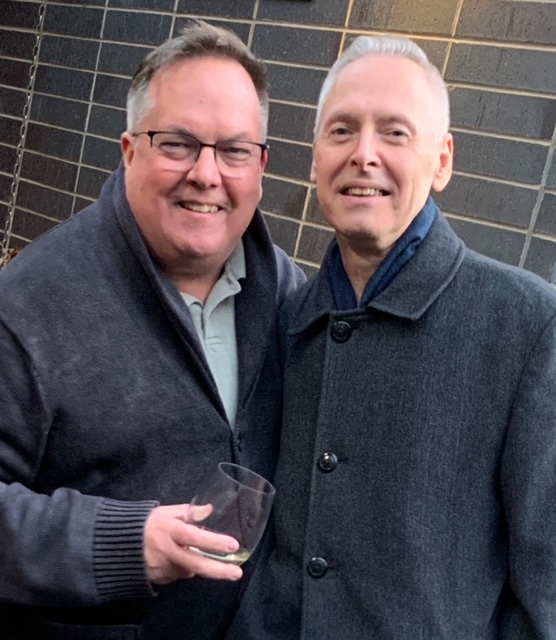
into them at local Edgewater favorites Mas Alla del Sol, La Pharmacie, Lost Hours, or maybe downtown at the Cliff Dwellers. I cannot even remember when or how I first met Mike; it seems like he’s always just been there. Mike uses his social media outreach, as well as his blog and emails, to bolster the efforts of his many friends throughout the city. If somebody is having a launch, Mike spreads the word, shows up himself, then often acts as a citizen journalist in sending out narrative and photographic postmortems. He reads the new releases and shares his enthusiasm for them. Mike is a talented writer so his interests naturally gravitate to the literary. Robert is an accomplished magician so he leans into the performing arts. I’ve gotten lots of emails which serve as alerts to the upcoming shows of Robert’s colleagues. Often times, the emails include free ticket offers—always, Mike and Robert are doing their best to make participation attractive and easy. They’re a perfect yin and yang couple – Mike outgoing, Robert a bit more reserved. Both are thoughtful and sensitive without taking anything or anybody too seriously. Mike is a natural storyteller, Robert more economical in conversation. Mike will often elaborate on Robert’s sparse commentary, prodding him into details or stories he knows Robert remembers. Both witty men make you laugh. They’ve been a couple for nearly 30 years, married for nearly 10, since it became legal in Illinois in 2014. Separately, they’re phenomenal individuals. Together, they’re somehow even more interesting and charismatic. Pairing the two as the emcees for our annual Chicago Literary Hall of Fame cocktail party was an obvious idea. The two act as impresarios in leading our guests through a few short intermissions in which we learn about special cocktails, literary history, and the like.
DGE: Mike, you’re a writer and deeply involved in Chicago’s literary community. We’ll get back to that. Robert, what is your connection to Chicago literature?
RC: My husband is my only connection to Chicago writers. When we started dating, Mike asked me out to a reading. I asked, "What kind of reading? A psychic reading? A palm reading?” He said, "No it’s actually a literary reading.” I turned him down.
DGE: Wait, you made a first date with Mike contingent on the details of the proposal? Isn’t that like scrutinizing the menu before you accept a dinner invitation?
RC: Yes. As the philosopher Alan Watts said, “You can so easily confuse the measure with what you are measuring; the money with the wealth; or even the menu with the dinner.”
MB: Eventually, we had another date that was a reading. It was at the old Three Arts Club. I’d been published in Tri-Quarterly and they were showcasing some of their writers and stories. That same night, Robert’s apartment [at Belmont and Halsted] got burglarized.
RC: We returned to my apartment late that night to discover it had been ransacked. The clothes in my bedroom closet and dresser drawers had been thrown on the floor and the bed. Almost everything in the apartment had been gone through. I had a small coin collection my parents and grandparents had given me. That was taken, along with other valuables. The saying, “A thief always returns to the scene of the crime” rings true. About a week later the thief returned while Mike and I were in the basement doing laundry. When we came back upstairs, the door on our back porch was locked and I couldn’t get inside. I was so angry, I ran down the back stairs and then climbed up the porches to my balcony. The thief must’ve heard me coming because he was gone by the time I got inside. My front door was swinging open. He stole my wallet that time. Mike said he’d never seen me move so fast. He said I climbed like a monkey.
DGE: Robert, you started Magic Chicago back in 2005. Tell me about that show.
RC: Magic Chicago was designed to revitalize magic by promoting different magicians in Chicago, throughout the country and even from around the
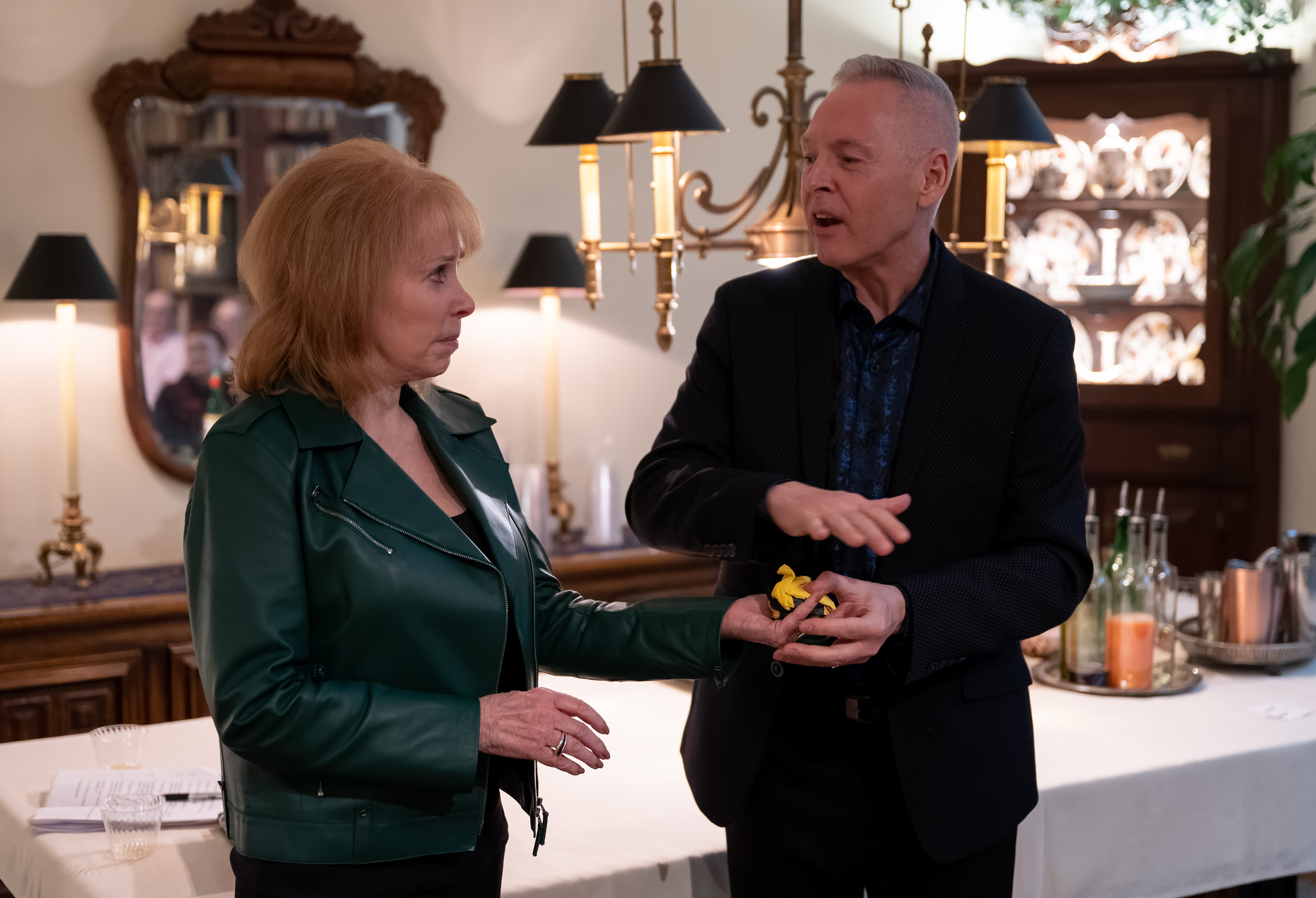 world. It was a stage show. We did it for 12 years. We started in the basement of Summerdale Community Church in Andersonville, which was 100 years old at the time. It’s been demolished. The reason we started there was so it would give us a place where we could try new material and be bad performers. We were just learning how to perform on stage and knew this would be a “safe” place for us to invite small numbers of family and friends to watch us perform. Then we moved on to paying audiences at City Lit Theater, located in the Edgewater Presbyterian Church, and, finally, to Stage 773 on Belmont, in Lakeview.
world. It was a stage show. We did it for 12 years. We started in the basement of Summerdale Community Church in Andersonville, which was 100 years old at the time. It’s been demolished. The reason we started there was so it would give us a place where we could try new material and be bad performers. We were just learning how to perform on stage and knew this would be a “safe” place for us to invite small numbers of family and friends to watch us perform. Then we moved on to paying audiences at City Lit Theater, located in the Edgewater Presbyterian Church, and, finally, to Stage 773 on Belmont, in Lakeview.DGE: Now you’re working more on the academic rather than performance side of magic?
RC: A dear friend of ours, Larry Haas, wrote three books on Eugene Burger’s performing material. Eugene was one of the great magicians and our dearest friend. I did copy editing and transcription work for the three books. I'm currently helping Larry with another magic book. I also make magic props that I sell on Larry’s website.
MB: These books are essential to the study of magic. It’s an apprentice style learning; magicians usually find a mentor or rely on magic books. What Robert’s been transcribing are either interviews or performances.
RC: I transcribe the moves required for the magical effect – a card or coin manipulation, for example. The descriptions must be very detailed to make the explanations clear and concise so the magical performer can understand how to execute it correctly. Eugene was my favorite writer, sort of magician’s magican.
MB: He was Robert’s magic teacher. He wrote at least a dozen books. He lectured and many of his lectures were filmed, with the magic effects explained. He lived right at Dearborn and Goethe on the Gold Coast, almost across the street from where Hemingway and Hadley briefly lived. He was a phenomenal guy. He performed at Biggs and Zebra Lounge, doing what is called restaurant magic or close-up magic. He became Dean of the McBride Magic & Mystery School in Las Vegas.
DGE: You’ve read a lot of magic books. What else?
RC: Most people would find my topics of interest dry and boring. My reading mostly consists of books on theology, religion, and esoteric teachings, all of which tend to be more on an academic level. I have that background; I earned a degree in theology from Moody Bible Institute. I’ve always been fascinated by the Bible and what mysteries it does or doesn’t hold.
MB: Robert refers to his years at Moody as his “time in the convent.”
DGE: My final semester at the University of Illinois in Champaign, I had fulfilled all my requirements, just needed some more credits. I decided to take a bunch of classes for no other reason than they interested me. One was a freshman-level English class called The Bible as Literature. I’d always excelled at humanities courses, especially literature. And this was an easy one. But it was at eight a.m. on Monday, Wednesday and Friday, and I was working the midnight shift at Super Gas. I told myself that I’d go straight from work to class, but I didn’t account for that extra hour. Every time, I immediately went to sleep. I aced the mid-term, but missed every quiz and was getting a zero for attendance. I fell behind on my reading for the final. It didn’t look too daunting: Luke, Job, and John. The night before, I was reading Job, reading Job, reading Job….it was really fucking long. That was all I finished. The teacher didn’t recognize me and carded me before the final. It was a three-part essay exam. I did great on Job, but the other two, I just kept deflecting. “Well, this passage in Luke reminds me of when Job…” I was a high B student. The U-Haul was ordered, my parents were planning a party back home….but I honestly didn’t know if I would graduate. I got my only D. A mercy D.
RC: That’s a great story. I’m somewhat surprised your course on Bible as Literature consisted of the Book of Job, the Gospel of Luke, and the Gospel of John. What’s more fascinating are the “Wisdom Books” in the Old Testament, such as Psalms, Proverbs, and the Song of Solomon.
DGE: Mike, your collection What You Don’t Know About Men contains some extraordinary Chicago stories: funny, wise, self-deprecating, at times sad. Have you always been interested in writing?
MB: I knew when I was 13 years old that I wanted to be a fiction writer. I asked my parents for a typewriter. They bought me a used portable Corona, which I still have today. I wrote mostly murder mysteries on that. I wrote a Sherlock Holmes story. I did a private investigator story that was supposed to be like Sam Spade, but he drank milk. It was set in Key Biscayne, Florida, where I had never been. The title was, “The Sorry Feeling.” I always gravitated toward English classes. I studied journalism and political science at Northern Illinois, and worked at the student newspaper, The Northern Star. Then after graduation, as I started working in public relations for a couple different nonprofits, I took a couple of different fiction writing classes at College of DuPage, where I had some inspirational teachers. I started getting published – in C.O.D.’s literary magazine, then, later, Tri-Quarterly and Private Arts. I placed two stories in American Way, the American Airlines in-flight magazine. Back in those days they published fiction and paid a thousand dollars a story. Then I went to Columbia College for a Masters degree. I went thinking I'd be a teacher, but soon realized teaching was not for me: teaching is for angels and I’m not an angel. I never earned the degree. But I wrote a lot and made lasting friendships. In 2011, I took all the stories that had been published in various magazines and published them as a book, through I-Universe.
DGE: Mike, the genesis of our now annual Chicago literary cocktail party starts with you calling me and saying, “Hey, I have this idea.” Remind me what prompted you to be interested in putting together this party.
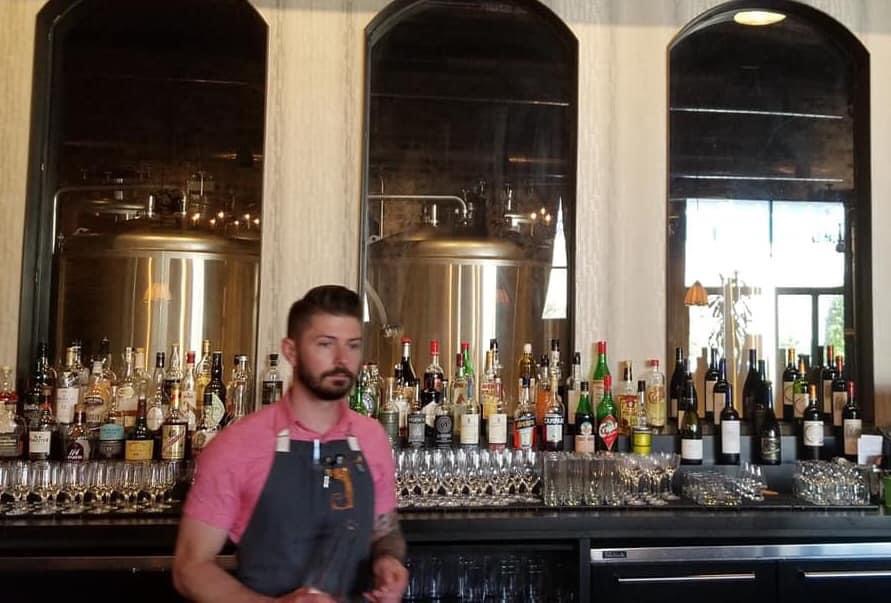
MB: We had met Ryan [Prindle], that was exactly it. It was right before the pandemic. Ryan was working at Band of Bohemia, in Ravenswood, just south of Lawrence on Ravenswood. It was a very high-end micro-brewery. Great food. Ryan was one of the bartenders there. On more than one occasion, Robert and I went in, sat at the bar, and when Ryan asked what we wanted, we said, “You pick.” It was that combination of meeting this talented mixologist and loving the Chicago Literary Hall of Fame.
RC: Ryan knows what he’s doing. He knows the history of various cocktails. He can communicate recipes quite well when he’s teaching the craft at parties. He creates this atmosphere of curiosity and can really engage his listeners. He has a wonderful personality. Of course, the topic of alcohol is a great tool to keep people’s attention.
MB: Yes! We’re actually learning a few things, and it’s more fun than school because you’re drinking.
DGE: Later this month, Ryan will again be our mixologist when we host our fourth installment of that party, The Great Gimlet, at Colvin House. It’s starting to feel like a real tradition. Give us your review of how things have gone so far.
RC: Each one gets better and better. The more we do it, the more we learn. It’s engaging and fun for people. They’re really good.
MB: We did the first two online, because we had to. Then we [went live] at Rita Dragonette’s lovely condo in Streeterville, which was the perfect venue for our first in-person event. Rita is a fantastic writer. Plus, she knows how to host a fun party. This year, we’ll be at Colvin House, which is one of the old Sheridan Road mansions, a real gem in Edgewater. It’s an event space now, used for a wide variety of celebrations, weddings, and community gatherings. I am so glad we’ll be there – it’s the best party of the year. It has everything we love: camaraderie, literature, Chicago, and booze. Really good booze.
DGE: The Colvin House is an historic and gorgeous place. Its decadent loveliness makes it perfect for this party. More so, I’m enamored with Angela and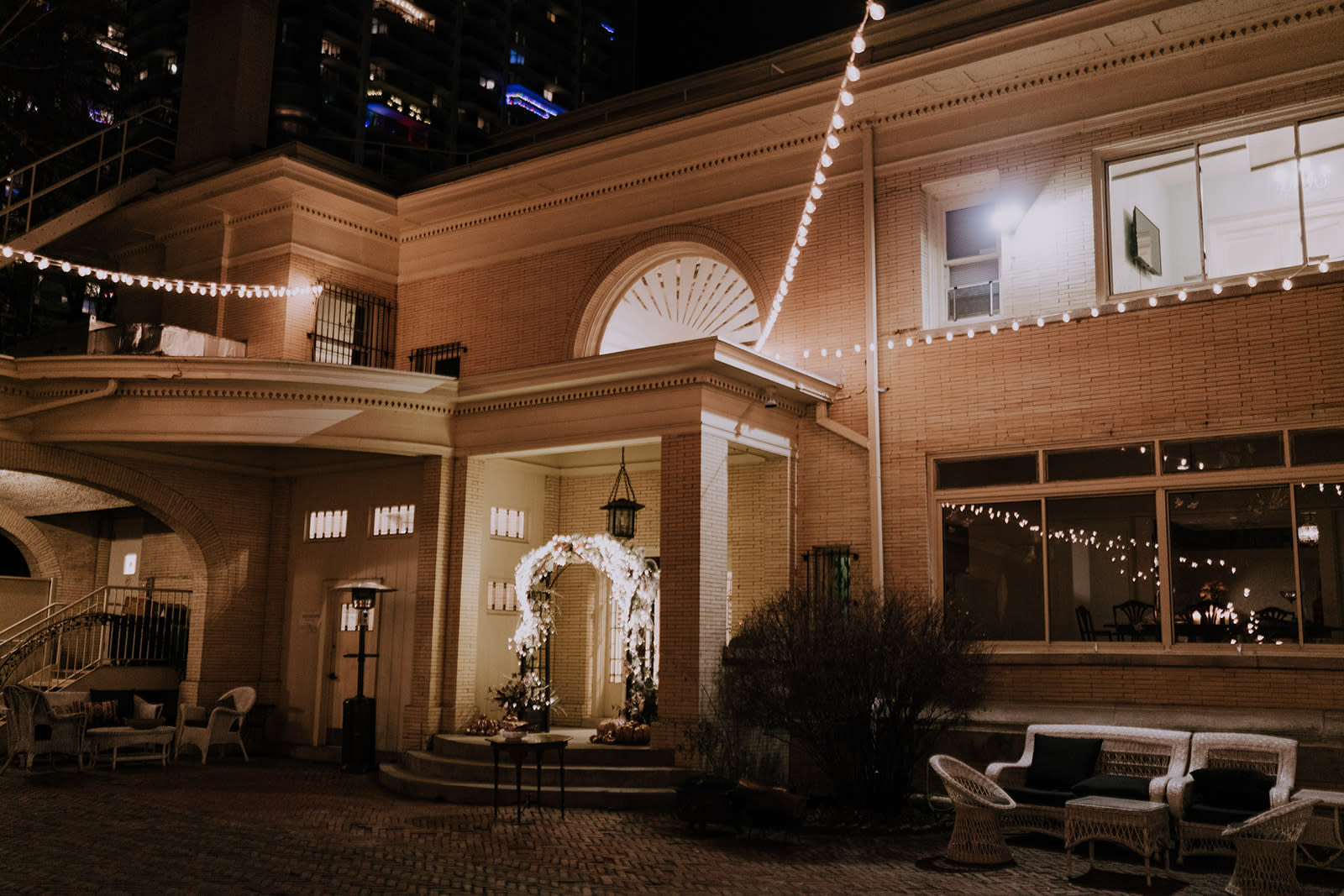 Amelia and all the people behind Colvin House. They’re such great people and are working with us to make this an even better party.
Amelia and all the people behind Colvin House. They’re such great people and are working with us to make this an even better party.
MB: One thing I have to say about you, Don, and the Hall of Fame’s Board: You really do think of the Chicago Literary Hall of Fame as a city-wide organization. You’re going to so many neighborhoods every year, whether it’s a statue unveiling, an induction ceremony, or Indie Bookstore Day – you really make it a tribute to the entire city, neighborhood by neighborhood. I was just looking at the induction classes: this is a great diverse group, from all over the Chicagoland area. And it’s fitting that we’re celebrating not only the individuals but also the neighborhoods that made the individuals.
DGE: You both are very familiar with Edgewater.
RC: We’ve now lived in Edgewater for about 12 years. The neighborhood is diverse. We can walk through the northern tip of Lincoln Park and reach Lake Michigan and two beaches in 10 minutes or less. We can also walk to Andersonville and Uptown – wide variety of restaurants and bars, the Green Mill, Big Chicks, Vincent, Hopleaf, the Middle Eastern Kitchen, Lao Sze Chaun, Calo, Jin Thai. And we can take the 147 express bus down Lake Shore Drive and be downtown in about 15 minutes.
MB: We love the community. In fact, “community” is what it’s all about – what this party is about, what the Chicago Literary Hall of Fame is about. Community-building. Fellowship. The opportunity to be together. These days, we’re so isolated in so many different ways. The Hall of Fame breaks through all of that and does a powerful job of bringing people together. We sell it as a party – but it’s really nourishing.
DGE: I’m always impressed, Mike, at how gifted you are at bringing people together. You make it seem effortless to unite people. I know your writing has taken a backseat to life, as happens to so many writers. What is your day job and how does that help you be so dynamic as a facilitator of Chicago’s cultural scene?
MB: I went into a period where I really wasn’t writing much fiction at all. I was focused on work and life events, other things going on in my family, moving. I was working at the job I’m at now, Vice President of Buffett Early Childhood Fund, which is a family foundation based in Omaha, Nebraska. We invest in early childhood education – and, really, you can’t help children if you’re not also helping families and building stronger communities. Anyway, I dove deep into my career. But I have just started writing fiction again. Finished one story, “Every Little Thing,” that I workshopped with Reginald Gibbons through one of the opportunities auctioned at one of the Hall of Fame’s year-end fundraisers. I’ve recently started another story, “Dry January,” so it feels like I’m getting back on the artistic bicycle. I’ve got notebooks filled with story ideas. I just need to carve out time to write them.
DGE: I like using The Great Gatsby as a theme this year, but I agonized a bit over the Chicago connection being a bit tenuous. What do you think?
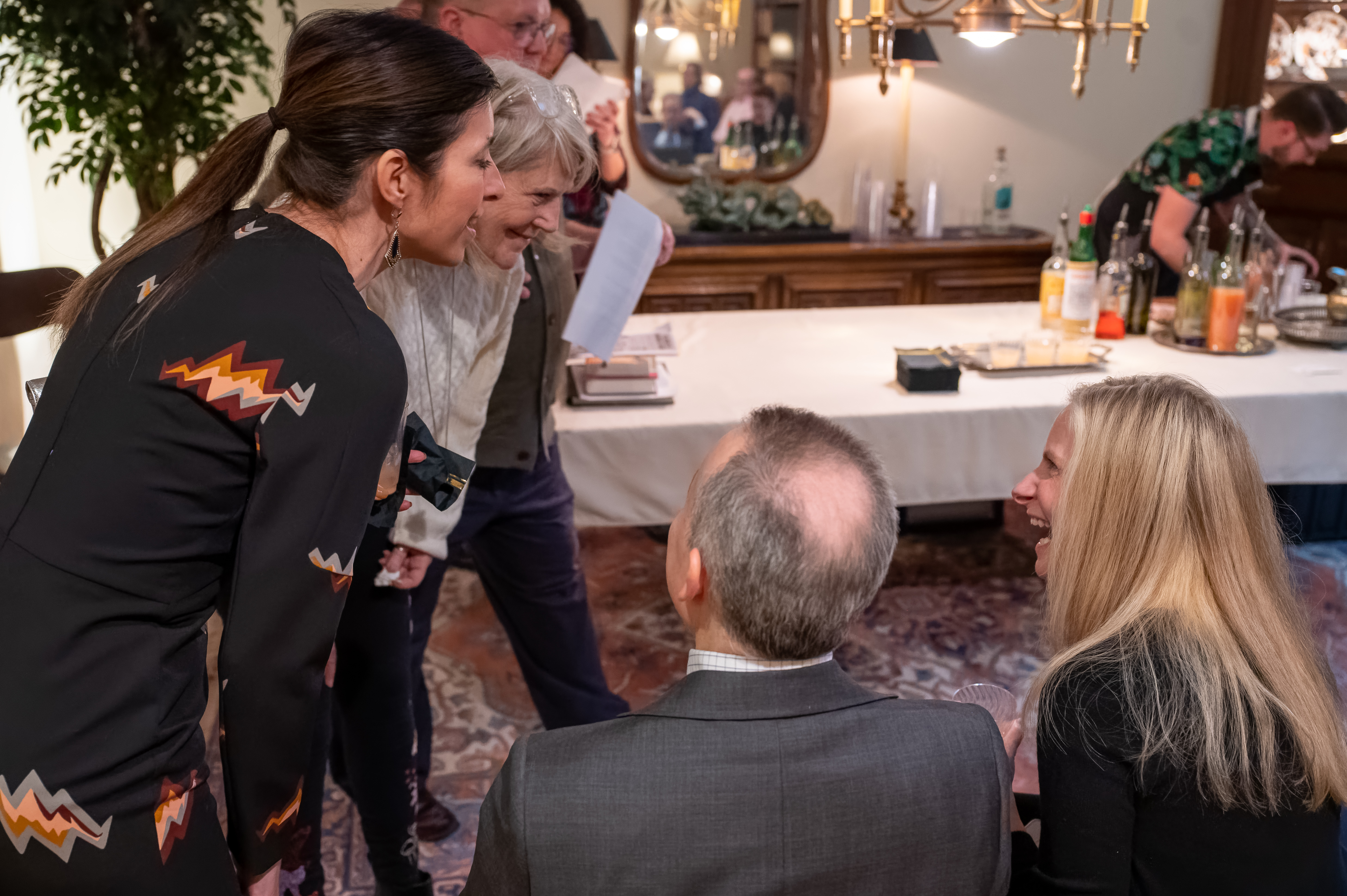
Michelle Moore (Bottom Right) at the 2023 party.
MB: Great question, and Michelle Moore will talk about this at the party, I’m sure. There are, in fact, several references to Chicago in Gatsby. The word “Chicago” is uttered again and again in the book to convey bootleggers, crooks, shady ways of doing business. Tom and Daisy have to leave Chicago because of Tom’s sordid affairs. Daisy asks Nick, “Do they miss me in Chicago?” Gatsby reads a Chicago newspaper for years hoping to catch a glimpse of Daisy. And if I remember right, toward the end of the book, Tom and Nick run into each other in Chicago. And there’s that Fitzgerald description of Union Station, or maybe that’s from another of his works? Anyway, you can tell Fitzgerald was quite familiar with this capital of The Middle West, as he called it. And then there’s Ginevra King and her life on the North Shore is another model for Daisy, in addition to Zelda. Michelle Moore is the perfect writer and scholar to address this. She wrote a whole book connecting the dots between Fitzgerald, Hemingway, Cather, Faulkner, and Chicago and American Modernism. She knows these connections in a very deep and knowledgeable way, and she’s a great storyteller.
DGE: Michelle will add another interesting dimension to the party. Her impromptu commentary at last year’s party was delightful.
RC: Michelle is brilliant. And her husband, Mark Weissburg, is a super smart lawyer – and, on the side, a magician! We’re everywhere.
DGE: I am genuinely excited to do this again and look forward to seeing you both on Saturday, Feb. 24. Can I expect to see you in period attire?
RC: Jay Gatsby sets a high bar when it comes to wardrobe. I’ll do my best to be as dapper as I can be.
MB: And I’ll start tossing colorful shirts around like Gatsby in that wonderful scene that makes Daisy weep. “They’re such beautiful shirts,” she cries. She’s sobbing! “It makes me sad because I’ve never seen such – such beautiful shirts before.”
Donald G. Evans is the author of a novel and story collection, as well as the editor of two anthologies of Chicago literature, most recently Wherever I’m At: An Anthology of Chicago Poetry. He is the Founding Executive Director of the Chicago Literary Hall of Fame, which will host its fourth annual fundraising cocktail party on Saturday, Feb. 4 at Colvin House (5940 N. Sheridan Road, Chicago), starting at seven p.m. The theme of this year’s party is The Great Gimlet, and scholar Michelle Moore will enlighten us with details about the relationship between Chicago and The Great Gatsby. Mixologist Ryan Prindle will make signature Chicago literary cocktails, including a French 75, a Gimlet, and a Sazerac. Registration is now open. We’ll close registration as soon as we reach our capacity, so don’t delay.


